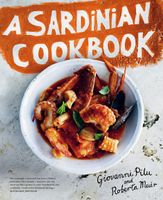Advertisement
Pastries and Desserts
Pasticceria e Dolci
By Giovanni Pilu and Roberta Muir
Published 2012

Most of Sardinia’s traditional desserts are baked. There are many biscuits and sweets that are only made once a year for festivals and other special occasions such as Christmas, Easter and All Saints Day (Tutti i Santi on 1 November), like the wonderful frisciolas, saffron and potato doughnuts made for Carnevale. These are something to look forward to, a way of marking the passing of the seasons and the cycles of the year.
The Arabic influence is obvious in many Sardinian sweets, with lots of recipes using almonds, which were introduced by the Arabs; dried fruits, citrus zest and other nuts are also common. Like Arabic sweetmeats, they’re often very sweet, topped with honey or syrup, and usually served as small bites, in many different shapes. As you’ll have seen by now, nothing is ever wasted, and so the grape skins and pips left over when the grapes are pressed to make wine (‘must’, or mosto in Italian) is boiled down to make a syrup called saba, which is often used in desserts or baking. The influence of other invaders, such as the Catalans, is seen in sweet treats such as crema Catalana and chidonzada, or quince paste.

